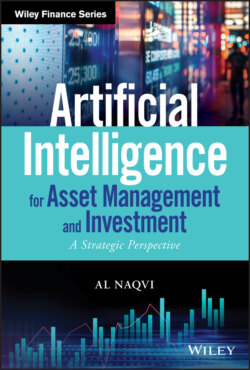Читать книгу Artificial Intelligence for Asset Management and Investment - Al Naqvi - Страница 14
WHAT ABOUT AI SUPPLIERS?
ОглавлениеIn all this chaos, suppliers of AI are not helping. AI software suppliers can be divided into six types of firms:
Newly launched AI platform companies: These firms claim to offer an AI platform. An AI platform, from their perspective, is a general-purpose solution that can be used to develop unlimited AI artifacts.
Tech giants platforms: Large and established tech firms have launched their own versions of AI platforms.
RPA firms: Robotic Process Automation is a rule-based software—which some argue is not AI—that has found significant adoption by many firms. It is simpler to understand for managers, and RPA vendors market it as the entry level solution to AI. Some even call it the gateway drug of AI. Some of the RPA players are blending their RPA (non-AI) offering with machine learning solutions to evolve as more integrated solutions.
Process automation firms: The legacy business process reengineering firms are also repositioning their systems as AI solutions.
Other packaged or off-the-shelf: Many firms offer packaged, or off-the-shelf, solutions that they claim to be AI solutions. Some of these suppliers have legitimate AI functionality; others have simply erased the B from their BI systems and replaced it with an A.
Function-specific AI firms: These firms market AI solutions by functional areas such as marketing or human resources. Typically, their software contains some AI functionality. Many of these firms are venture-financed start-ups.
AI implementation firms are composed of the following:
Management consulting firms: These are large management or strategy consulting firms.
Large systems integrators: These firms are found in the echelons of Washington, DC government contracting space.
Tech firms: Large tech firms such as Google and Amazon.
AI boutique firms: Many AI-centered boutique firms are launched by AI professors and AI experts.
Data management firms: Some of the basic data-centric support work is performed by data management firms.
Suppliers are equally confused about how to make sense of this technology. They tried to force-fit AI into compartments that they had built for digital transformations and which had worked reliably well for over four decades—but it all backfired. AI does not seem to fit the frames developed to implement ERP or CRM. Suppliers tried to explain to the clients that AI will transform their companies, but they could not explain how and why. They produced white papers and case studies but could not point to a single firm that had successfully transformed itself. Buried under decades of legacy, some even tried to repurpose the old molds of PowerPoints and business process reengineering era toolkits, but they did not impress the clients. They began recalibrating AI projects, only to discover that a great many were failing. After initial failure, some consulting firms had the audacity to advise the investment firms that they needed to go big and bet more, which essentially meant to have mega-sized center of excellence contracts with the consulting firms—but even for those who invested in those projects, the results did not improve much. Finally, the grandiose visions and promises of audacious transformations were tapered to on-the-ground realities. Suppliers of AI realized that the best way to sell to companies is to divide and conquer. Financial services firms were segmented into smaller pieces, and instead of selling visions of transformation, suppliers turned to selling small point solutions. Sales teams found entry paths leading into department heads, IT managers, and middle managers and began selling small point solution deals. The effect of such a sales strategy was catastrophic for clients. Investment firms turned into collectors of malfunctioning or substandard AI software, AI software proliferation ensued, and the process of death by the thousand papercuts started for many firms.
The strategy consulting firms are experiencing their own Darwin moment and are unsure how to function in the rapidly evolving AI-centered economy. The crisis unleashed by coronavirus has further shattered the AI management consulting industry. For the investment world, however, the pandemic has demonstrated the fragility of markets and made a strong case for the need for AI technology to help predict the emergent dynamics of the complex systems in which we operate in the modern era.
